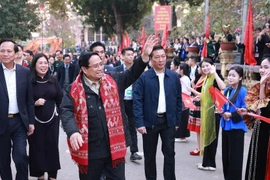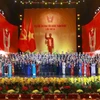Hanoi (VNS/VNA) - Vietnamese mangoes have made remarkable strides in the Chinese market, surpassing major exporters such as Thailand, Peru and Australia to capture an impressive 97% of China’s mango import market share in the first quarter of this year.
This outstanding success is attributed to a combination of competitive pricing, consistent quality and timely supply.
According to data from Chinese Customs, China spent 29 million USD importing mangoes from six countries in the first three months of 2025 - 21 times more than the same period last year. While import values from traditional suppliers like Thailand and Peru dropped sharply, Vietnam emerged as the only bright spot, achieving a breakthrough: nearly 40,700 tonnes of mangoes were exported, generating 28 million USD in revenue -145 times more than the previous year. The average export price of Vietnamese mangoes also rose by 72.6%, reflecting strong consumer acceptance in China.
A key driver behind Vietnam’s growing dominance is its competitive pricing. On average, Vietnamese mangoes were exported at around 700 USD per tonne - similar to prices from Cambodia but significantly lower than 6,000–11,000 USD per tonne prices from countries such as Thailand, Peru and Australia. In addition, Vietnam’s geographical proximity to China allows for lower logistics costs, faster delivery and better preservation of fruit quality upon arrival.
Notably, Vietnam has capitalised on its off-season mango harvest, which runs from September to March - a period when domestic mango supply in China is limited. This seasonal advantage has enabled Vietnamese mangoes to enter the market when demand peaks, driving prices higher and bringing substantial profits to local farmers. At the height of the off-season, premium-grade mangoes in Vietnam fetched up to 100,000 VND per kilogramme.
In addition to cost advantages, Vietnamese mangoes have impressed Chinese consumers with their consistent quality, rich flavour, mild sweetness and natural aroma. Specialty varieties such as Hoa Loc and Cat Chu have gained significant popularity, not only for fresh consumption but also for industrial processing.
Currently, nearly 2,000 hectares of mango orchards in the Mekong Delta are certified under VietGAP and GlobalGAP standards, meeting food safety and traceability requirements - critical conditions for access to high-end markets such as China, the Republic of Korea, Japan and the United States.
However, these opportunities are not without challenges. From May onwards, as China begins harvesting its domestic mango crop, demand for imports declines sharply, resulting in a drop in domestic mango prices. At times, prices have plummeted to just a few thousand VND per kilogramme, causing significant losses for both farmers and exporters. This underscores the risks of relying too heavily on a single market.
To sustain growth and ensure long-term development, the mango sector must continue diversifying its export destinations, expanding into high-potential markets, and investing in deep processing and post-harvest preservation technologies. Expanding the area under VietGAP, GlobalGAP and other international certifications is also essential to enhance the global competitiveness of Vietnamese agricultural products./.
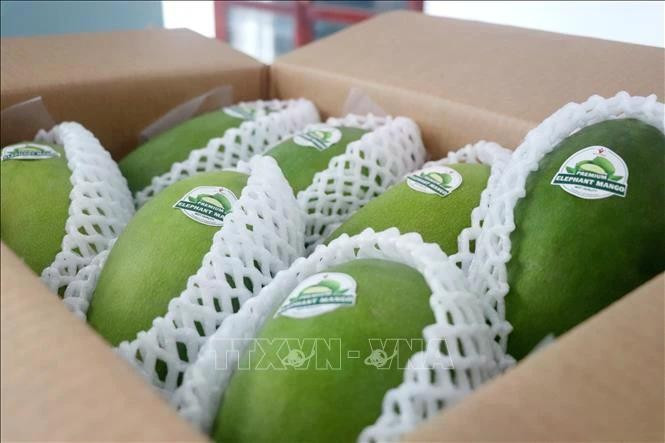
See more

Vietnam exports over 8 million tonnes of rice, earning 4.1 billion USD in 2025
Vietnam exported more than 8.06 million tonnes of rice in 2025, earning over 4.1 billion USD.

VASEP forecasts pangasius exports to hit 2.3 billion USD this year
VASEP forecasts that pangasius export turnover could reach around 2.3 billion USD in 2026, supported by tightening global whitefish supplies and improving demand in several key markets.
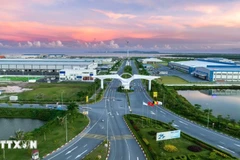
Hai Phong city targets 4.3 billion USD in FDI in 2026
Hai Phong’s investment appeal is underpinned by a rapidly expanding development space, including the Southern Coastal Economic Zone covering more than 20,000 hectares, a planned free trade zone, deep-water ports at Lach Huyen, and 12 industrial parks newly established in 2025.

Vietjet shifts domestic check-in at Tan Son Nhat from January 13
During the recent New Year 2026 holiday peak, Vietjet added 380 flights, equivalent to nearly 78,000 additional seats, on many key domestic routes linking Hanoi and Ho Chi Minh City with destinations such as Vinh, Thanh Hoa, Hai Phong, Da Nang, Phu Quoc, Nha Trang and Da Lat.

Capital sources expanded for sustainable growth
According to the State Bank of Vietnam (SBV), by the end of November 2025, outstanding green credit was estimated at around 750 trillion VND (28.55 billion USD), with an average growth rate exceeding that of overall credit in the economy.

Traceability emerges as protective shield for Vietnam’s exports
Traceability data are evolving into a critical layer of protection, helping exporters reduce tariff risks, shorten inspection times and strengthen proof of origin, thereby avoiding exclusion from formal distribution networks.
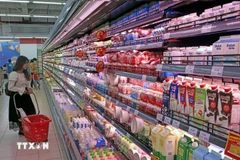
Retail market expands sharply, sustainability challenges persist
According to a report on recently released by the Ministry of Industry and Trade’s Agency for Domestic Market Surveillance and Development, the size of the market reached more than 7 quadrillion VND (about 266 billion USD) in 2025, up around 10% compared with 2024.
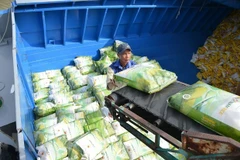
Vietnam eyes Israel as promising rice market under free trade deal
The Vietnam - Israel Free Trade Agreement (VIFTA), which took effect in late 2024, is poised to provide a fresh boost to agricultural exports, with rice at the forefront.

Resolution 79: State economy to lead growth
Resolution 79 is described as a “clear action declaration” by the Politburo, saying the state economy is not only responsible for maintaining macroeconomic stability, but must also become the force leading a new growth model that is green and sustainable.

Vietnam leverages export advantages within RCEP region
In 2025, seafood exports to China alone exceeded 2.2 billion USD, up about 33% compared to 2024. Shipments to Japan fetched nearly 1.7 billion USD, a year-on-year increase of 14.6%, while those to the Republic of Korea and Australia grew by 9.6% and 3.2%, respectively.
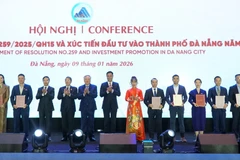
Da Nang continues targeted investment promotion approaches
According to Chairman of the Da Nang People’s Committee Pham Duc An, the city prioritises building sustainable economic ecosystems and focuses on key breakthrough sectors with strong spillover effects, including high technology and digital transformation, logistics, urban infrastructure, finance, processing and manufacturing industries, high-tech agriculture, and the pharmaceutical and medicinal herb industry.

📝OP-ED: Resolution 79 – Launchpad for national aspirations
Resolution 79 is not only about SOEs. At a deeper level, it is about how Vietnam reorganises its development drivers in a world that is changing at breakneck speed.
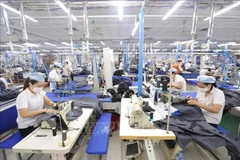
UOB raises Vietnam’s 2026 GDP growth forecast to 7.5%
In 2025, Vietnam’s GDP grew by 8%, beating UOB’s forecast of 7.7% but still falling short of the Government’s target of 8.3–8.5%, which would have needed an extraordinary boost in the final quarter.
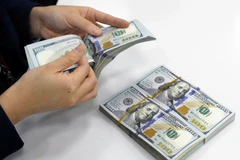
Reference exchange rate up 4 VND on January 10
With the current trading band of +/- 5%, the ceiling rate applicable for commercial banks during the day is 26,388 VND/USD, and the floor rate 23,874 VND/USD.

Infrastructure key to unlocking tourism’s role in double-digit growth target
With transport links running smoothly, urban infrastructure upgraded and digital platforms built out in a more systematic way, tourism would move beyond a purely consumption-driven sector to become a deeper, more durable engine of growth.

Hyundai sales in Vietnam rise almost 23% in December
In 2025, sales reached 53,229 vehicles across the market, a result considered a testament to the efforts by TC Group, Hyundai Thanh Cong, and the entire Hyundai dealership network nationwide amidst a volatile market.

Da Nang approves plan key infrastructure developers at FTZ
The Da Nang FTZ is expected to contribute 17.9% to the city’s gross regional domestic product and create 127,000 jobs by 2040, with total investment needs estimated at 40 trillion VND (1.6 billion USD).
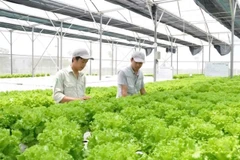
HCM City accelerates shift toward ecological urban agriculture
The city’s agricultural sector is undergoing a strong transformation, restructuring toward higher value-added and sustainable development. In recent years, the sector has maintained steady growth, with agricultural, forestry and fisheries output rising by an estimated 2.5% annually.
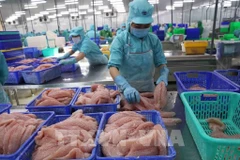
Vietnam records biggest trade surplus with Netherlands among European partners
Vietnam’s exports to the Netherlands totalled 13.5 billion USD last year, up 3.7% compared to 2024, while imports stood at 825 million USD, rising 5.2%.
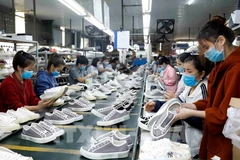
Footwear-leather industry seeks new drivers to sustain growth
Vietnam currently ranks third globally in footwear production, with around 1.4 billion pairs manufactured annually, behind China and India, and second in exports with approximately 1.3 billion pairs a year.



